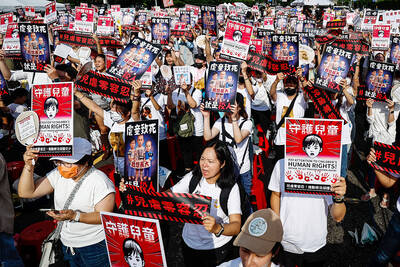Several prosecutors have recently been detained or released on bail on corruption charges, damaging the reputation of the nation's legal system. With the Ministry of Justice (MOJ) having launched an investigation into another 27 prosecutors, the profession is coming under fire, with some saying prosecutors have too much power and that institutional flaws are behind the problems.
A lead prosecutor at Kaohsiung's Taiwan High Prosecutors' Office, Chang Hsueh-ming (
At the Taipei Prosecutors' Office and Kaohsiung Prosecutors' Office, for example, Chang said that each prosecutor handles 80 to 90 criminal cases a month. With about 100 prosecutors in each of the two offices, the head and lead prosecutors are too busy to oversee every case.
As a result, Chang said, prosecutors are able to decide whether or not to indict defendants, meaning that they enjoy more power than the law actually gives them.
After former Yunlin County prosecutor Hsu Wei-yu (
Shih has asked head prosecutors nationwide to carefully review the cases handled by their offices.
Shih acknowledged that among the roughly 1000 prosecutors nationwide, some are bound to be corrupt and he has asked head prosecutors to pay more attention to prosecutors' personal lives.
Shih said that former Chiayi prosecutor Sung Tsung-yi (
Hsu Wei-yu is another example. Evidence shows he often dined and went to hostess clubs with local police and gangsters, Shih said.
Shih said "prosecutors' personal lives can, to a certain degree, reveal whether or not they are clean."
Shih has asked head prosecutors to report to the ministry if prosecutors are found to have close relations with gangsters, those who run illegal businesses or local police.
Shih said that as part of a crackdown on bad prosecutors, the ministry has launched an investigation on another 27 prosecutors."
Chang said the nation's prosecutors have enjoyed more power since the implementation of a law in September 2003 that allows indictments to be suspended (緩起訴).
Chang said that under the law, prosecutors can suspend an indictment if the defendant has committed a minor crime or admits guilt.
Chang said the law was introduced to reduce the number of criminal cases sent through the legal system. It has effectively reduced prosecutors and judges' work burdens, but also gave prosecutors new rights.
"It is hard to prevent prosecutors from accepting bribes in exchange for suspending a defendant's indictment," Chang said.
Chang said when the law was drafted, some legal experts had been concerned that it might cause corruption problems, but the law was still passed.
Shih said that some prosecutors like to cultivate relations with police and agents of the Ministry of Justice's Investigation Bureau (MJIB).
But experience has shown that this kind of cooperation often leads to collusion between the two sides.
Shih said that Hsu, who led an investigation by police into a multi-million dollar professional baseball game-fixing scandal, is suspected of betting on baseball games with the officers. Hsu is also accused of taking and sharing bribes with police officers who had worked with him for several years.
Shih said that former Kaohsiung prosecutor Chen Cheng-ta (
Shih said that two agents from the MJIB who had worked with Chen were also detained, on suspicion of being involved in the fabricated charges.
Kaohsiung prosecutors have said Chen charged the two men with weapons smuggling in order to apply for a reward offered by the ministry to those who uncovered weapons smuggling.

The Ministry of Education (MOE) is to launch a new program to encourage international students to stay in Taiwan and explore job opportunities here after graduation, Deputy Minister of Education Yeh Ping-cheng (葉丙成) said on Friday. The government would provide full scholarships for international students to further their studies for two years in Taiwan, so those who want to pursue a master’s degree can consider applying for the program, he said. The fields included are science, technology, engineering, mathematics, semiconductors and finance, Yeh added. The program, called “Intense 2+2,” would also assist international students who completed the two years of further studies in

Former president Tsai Ing-wen (蔡英文) departed for Europe on Friday night, with planned stops in Lithuania and Denmark. Tsai arrived at Taiwan Taoyuan International Airport on Friday night, but did not speak to reporters before departing. Tsai wrote on social media later that the purpose of the trip was to reaffirm the commitment of Taiwanese to working with democratic allies to promote regional security and stability, upholding freedom and democracy, and defending their homeland. She also expressed hope that through joint efforts, Taiwan and Europe would continue to be partners building up economic resilience on the global stage. The former president was to first

Taiwan will now have four additional national holidays after the Legislative Yuan passed an amendment today, which also made Labor Day a national holiday for all sectors. The Chinese Nationalist Party (KMT) and Taiwan People’s Party (TPP) used their majority in the Legislative Yuan to pass the amendment to the Act on Implementing Memorial Days and State Holidays (紀念日及節日實施辦法), which the parties jointly proposed, in its third and final reading today. The legislature passed the bill to amend the act, which is currently enforced administratively, raising it to the legal level. The new legislation recognizes Confucius’ birthday on Sept. 28, the

CHANGES NEEDED: About 84,000 people signed a petition advocating for stronger protection laws, with people traveling from other parts of Taiwan to join the cause A rally in Taipei yesterday called on the government to increase penalties for and protections against child abuse, following the death of a one-year-old boy nicknamed Kai Kai (剴剴) in 2023. Kai Kai was allegedly tortured to death on Christmas Eve 2023 by his licensed at-home caregiver, Liu Tsai-hsuan (劉彩萱), and Liu’s sister, Liu Jou-lin (劉若琳). The two attended their final court hearing on Wednesday, with sentencing scheduled for Tuesday. The rally, organized by a group called the “Mothers’ Online Group” — a grassroots movement formed on social media by concerned parents and citizens following Kai Kai’s case — took place on